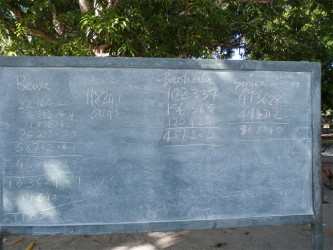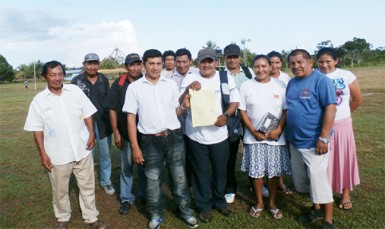Concerned at the granting of land for various reasons including large tracts of forest to controversial logging company Baishanlin and others, three North Rupununi communities have applied for extensions to their land.
“We have been using these lands and waters for hundreds of years. We feel pain when we see the government giving our land to the foreign logging companies. We feel hurt when government will not give us the indigenous people our land title,” one villager was quoted as saying in a statement issued by the non-governmental organisation Justice Institute Guyana.
Following a recent training programme, Apoteri, Rewa and Crashwater claimed extensions to their lands using the Amerindian Act 2006. The Amerindian communities expressed serious concern about the giving out of large tracts of forest to Baishanlin and other foreign companies, while they are still waiting for their traditional rights to be respected, the statement said.
Michael Williams, the chairman of the North Rupununi District Development Board told Stabroek News recently that the communities should be given first preference when using the land. He said that the communities “slept” on requesting land extensions until they were jolted by the Baishanlin concessions. The Baishanlin concessions are nearest to Apoteri. He noted that the communities were engaged in eco-tourism initiatives and had a management plan in place for the endangered Arapaima and they were worried how logging operations and indiscriminate hunting might affect the wildlife upon which they depend.

He said too that the companies are not aware of the communities’ plans and might not take this into account. “They don’t know the regulations,” he said. “Our fear is that they would want to overharvest the resources that the communities depend on.”
Meanwhile, the Justice Institute Guyana statement said that Rewa expressed concern about the impact that Baishanlin and other timber concessions could have on them and their future sustainable use of the lands. The Rewa Village Council and the Rewa Ecolodge have written to the Environmental Protection Agency requesting a meeting in Rewa and setting out their terms for the proposed environmental impact assessment, the statement said.
It noted that Rewa has title to 118,241 acres of land and from information provided to the communities, it seems that the permits to Baishanlin (439,325 acres) and Simon and Shock (969,340 acres) amount to over 1.4 million acres.
According to the Justice Institute Guyana, another community, Crashwater has written to the Commissioner of Forests asking him not to hand out any more permits until their land issues have been resolved. All three communities have asked Minister of Amerindian Affairs Pauline Sukhai to follow the timetable set in the Amerindian Act 2006 which requires her to respond to the communities within one month and to start investigating their claim within six months, the statement said.
“Time and again Minister Sukhai is in breach of the Amerindian Act 2006. Minister Sukhai’s failure to deal with land issues is causing huge problems for the people she is supposed to be serving and is leading to conflicts with miners and loggers. These conflicts could and should be avoided,” Melinda Janki, the executive director of the Justice Institute Guyana, was quoted as saying.
Janki said that the extensions should have been submitted years ago but the communities have wasted eight years since the Amerindian Act was passed in 2006. According to the director, some organisations have been telling Amerindian communities, the UN and other international bodies, that the Amerindian Act 2006 does not protect Amerindian rights. That misinformation is costing the Amerindians their land and is leading to conflicts with logging and mining. When Amerindians don’t claim the land, the State will inevitably use it to get money, she said.

Further, the statement said that Crashwater also used the training by the Justice Institute to apply the Amerindian Act 2006 to settle a dispute with Yakarinta over farm lands. The two village councils developed and signed a Memorandum of Understanding by which all traditional rights will be respected. They also agreed on the procedure they will follow in future in order to determine issues relating to the use of farm lands, it said.
“It is an indication that the communities are now beginning to understand the importance of learning what the Amerindian Act says and how they can use it. Three land claims, two letters to the EPA, a letter to the GFC and this Memorandum of Understanding show how this may be the most successful training event ever held in the Rupununi,” Williams was quoted as saying.
The statement noted that the training was conducted under a capacity building project funded by the Delegation of the European Union to Guyana under the European Instrument for Democracy and Human Rights.
Baishanlin has announced big plans in various sectors for Guyana but concerns have been raised by some analysts that its primary interest is logs for export with little downstream processing. Its access to key parts of the economy have also raised questions about the regulation of its business by the forestry commission and associated bodies.




